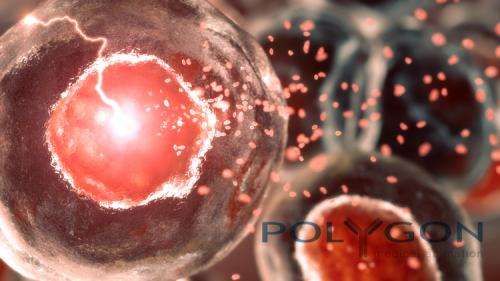Cellular 'groundskeeper' considered in cancer fight

A greater focus on autophagic activity and metabolism in cancerous cells could make a significant difference in the development of more effective cancer treatments, researchers contend.
Functioning as a sort of cellular groundskeeper, autophagy helps remove damaged proteins or organelles, facilitating their degradation into recyclable molecules to be released into the cytoplasm for re-use by the cell.
A catabolic process, autophagy has been linked to cancer prevention, clearing out damaged materials and promoting homeostasis (stable equilibrium between elements).
But, it has also been implicated in aiding the survival of established tumours, responding to metabolic stress to create pathways for cells to persist in cytotoxic and hypoxic conditions.
This downside has led previous researchers to focus on its role in chemotherapy and anti-cancer drug resistance.
However, Curtin University School of Pharmacy and Biosciences Research Precinct Professor Crispin Dass says understanding autophagy's dual nature is vital.
"The idea of metabolism as a target for cancer therapy is not new but was previously put aside due to the opinion that its use would be more deleterious than beneficial," he says.
"With the advances in the knowledge of the exact mechanisms and pathways involved in metabolic function, the proposal of metabolism as a cancer therapy target is becoming more feasible given that it can now be targeted to transformed cells, including indirectly through interactive pathways such as autophagy.
"This highlights the need to continue to pursue research into autophagy, in an attempt to truly understand its role in various cell lines and identify the variations in response to alternative stimulus."
Autophagy crucial for future treatment
Prof Dass says that without an increased focus on autophagy, and an understanding of its molecular mechanisms, significant improvements to current and future chemotherapeutic treatment may be unlikely.
"Autophagy is an area that potentially could make a difference in patient care and aid in the development of more effective cancer treatment," he says.
"In an area of research where a clear majority of benchwork is devoted to finding new cancer targets and subsequently, drugs to target these, a relook at the way the traditional drugs induce cell death in tumours may pave the way to better clinical management of this class of disease."
He says another research area of interest is exploring how drug delivery systems such as nanoparticles made of biodegradable and 'green' resource materials can induce cell biological events in cells, including autophagy.
















